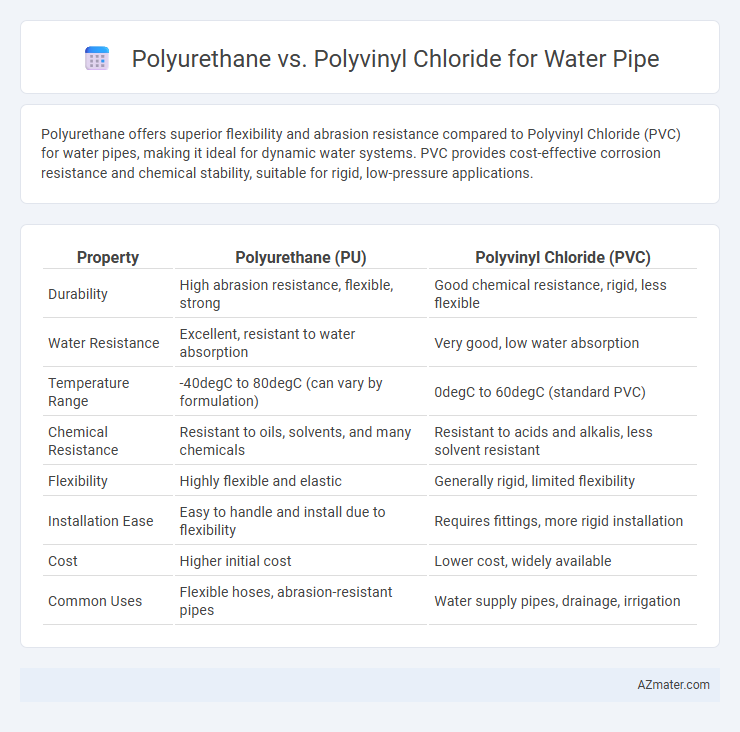Polyurethane offers superior flexibility and abrasion resistance compared to Polyvinyl Chloride (PVC) for water pipes, making it ideal for dynamic water systems. PVC provides cost-effective corrosion resistance and chemical stability, suitable for rigid, low-pressure applications.
Table of Comparison
| Property | Polyurethane (PU) | Polyvinyl Chloride (PVC) |
|---|---|---|
| Durability | High abrasion resistance, flexible, strong | Good chemical resistance, rigid, less flexible |
| Water Resistance | Excellent, resistant to water absorption | Very good, low water absorption |
| Temperature Range | -40degC to 80degC (can vary by formulation) | 0degC to 60degC (standard PVC) |
| Chemical Resistance | Resistant to oils, solvents, and many chemicals | Resistant to acids and alkalis, less solvent resistant |
| Flexibility | Highly flexible and elastic | Generally rigid, limited flexibility |
| Installation Ease | Easy to handle and install due to flexibility | Requires fittings, more rigid installation |
| Cost | Higher initial cost | Lower cost, widely available |
| Common Uses | Flexible hoses, abrasion-resistant pipes | Water supply pipes, drainage, irrigation |
Introduction to Water Pipe Materials
Water pipe materials such as polyurethane (PU) and polyvinyl chloride (PVC) are chosen based on durability, flexibility, and chemical resistance. Polyurethane offers superior elasticity and abrasion resistance, making it ideal for flexible and high-pressure applications. Polyvinyl chloride is valued for its rigidity, cost-effectiveness, and excellent resistance to chemicals and corrosion in plumbing systems.
Overview of Polyurethane Pipes
Polyurethane pipes offer exceptional flexibility and abrasion resistance, making them ideal for applications requiring durability under dynamic conditions. Their high tensile strength and chemical resistance outperform many standard materials, providing longer service life in water transport systems. Compared to polyvinyl chloride (PVC), polyurethane pipes maintain elasticity at low temperatures and resist impact damage, reducing the risk of leaks and maintenance costs.
Overview of Polyvinyl Chloride (PVC) Pipes
Polyvinyl Chloride (PVC) pipes are widely used in water supply systems due to their excellent corrosion resistance, lightweight nature, and cost-effectiveness. These pipes exhibit high chemical stability, low reactivity with water, and strong mechanical strength, making them suitable for both potable and non-potable water applications. PVC pipes also offer easy installation and long service life, contributing to their popularity in residential, commercial, and industrial plumbing systems.
Chemical Resistance Comparison
Polyurethane and polyvinyl chloride (PVC) exhibit distinct chemical resistance properties crucial for water pipe applications. Polyurethane offers superior resistance to oils, solvents, and abrasion, making it ideal for environments exposed to aggressive chemicals and mechanical wear. PVC excels in resisting acids, alkalis, and many inorganic chemicals, providing durability against broad-spectrum chemical exposure in water distribution systems.
Mechanical Strength and Durability
Polyurethane water pipes exhibit superior mechanical strength with high tensile and abrasion resistance, making them ideal for applications requiring flexibility and impact endurance. Polyvinyl chloride (PVC) pipes offer excellent chemical resistance and rigidity but tend to be more brittle, leading to potential cracking under stress or low temperatures. The durability of polyurethane pipes surpasses PVC, especially in dynamic environments, due to their enhanced elasticity and resistance to wear over time.
Flexibility and Installation Ease
Polyurethane water pipes exhibit superior flexibility compared to polyvinyl chloride (PVC), allowing for easier bending and reduced risk of kinking during installation in tight or complex spaces. This enhanced flexibility enables faster, more efficient installation, minimizing the need for additional fittings and reducing labor costs. PVC pipes, while rigid and durable, typically require more precise alignment and additional connectors, which can complicate the installation process in areas with frequent directional changes.
Longevity and Maintenance Requirements
Polyurethane water pipes offer superior flexibility and resistance to abrasion, leading to a longer lifespan compared to polyvinyl chloride (PVC) pipes, which are more rigid but prone to cracking under extreme temperature changes. Polyurethane's resistance to chemical corrosion reduces maintenance frequency, whereas PVC pipes often require more frequent inspections and repairs due to susceptibility to UV damage and chemical degradation. Overall, polyurethane pipes provide enhanced durability and lower maintenance needs, making them an ideal choice for long-term water transport applications.
Environmental Impact and Sustainability
Polyurethane water pipes offer greater sustainability due to their higher durability and longer lifespan, reducing the frequency of replacements and minimizing waste compared to polyvinyl chloride (PVC). PVC production involves chlorine-based chemicals that release toxic dioxins, posing significant environmental and health risks throughout its lifecycle. Polyurethane's lower environmental footprint and recyclability make it a more eco-friendly option for water pipe applications seeking reduced ecological impact.
Cost Analysis: Polyurethane vs PVC
Polyurethane water pipes generally cost more than polyvinyl chloride (PVC) pipes due to the material's superior flexibility and durability, which reduce maintenance expenses over time. PVC pipes offer a lower upfront price, making them a budget-friendly option for large-scale projects with less demand for elasticity or resistance to extreme conditions. Evaluating total lifecycle costs highlights polyurethane as a cost-effective solution in environments requiring high performance, whereas PVC remains preferred for straightforward, cost-sensitive installations.
Choosing the Best Material for Water Pipes
Polyurethane water pipes offer superior flexibility, chemical resistance, and durability compared to polyvinyl chloride (PVC), making them ideal for applications requiring high pressure and temperature variations. PVC pipes boast cost-effectiveness, ease of installation, and resistance to corrosion and abrasion, proving suitable for standard residential and irrigation water systems. Selecting the best material depends on specific requirements such as operational environment, pressure ratings, longevity expectations, and budget constraints.

Infographic: Polyurethane vs Polyvinyl Chloride for Water Pipe
 azmater.com
azmater.com